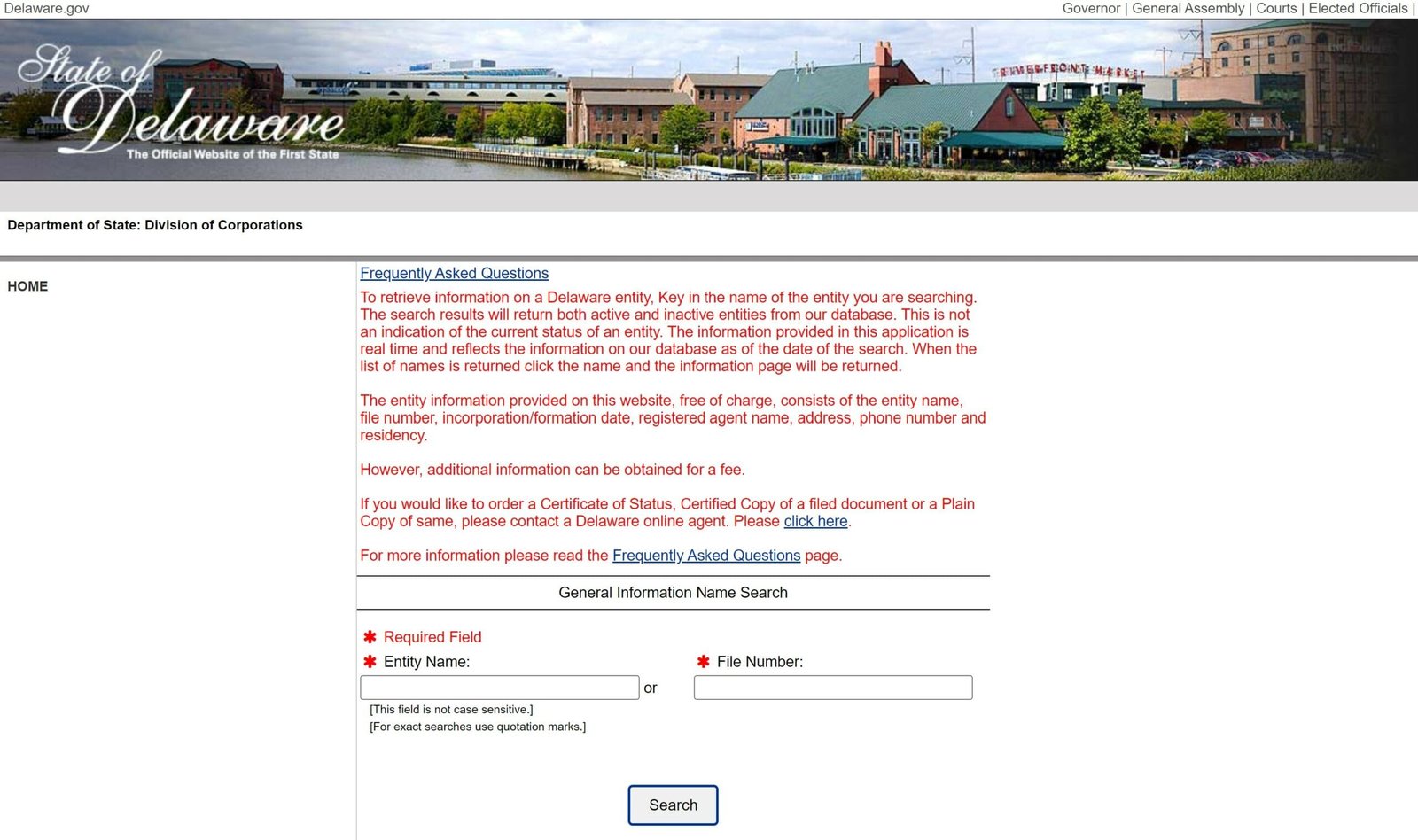How to Do a Delaware Business Name Search
Selecting the right name is an essential first step for your Delaware LLC, requiring you to ensure the name’s availability. Searching the Delaware business name database is vital to avoid infringing on existing business names and intellectual property rights within the state.
Our Delaware LLC name search guide offers essential tips on checking LLC name availability in Delaware, reservation, and registration, helping you secure a unique and compliant business identity efficiently.
How Do I Look Up an LLC in Delaware? (Summary)

Steps to look up Delaware LLC name search availability:
- Go to the Delaware business entity database search
- Check if your chosen business name is available with the Delaware Division of Corporations Name Search tool
- Click on the “Entity Search” option on the left-hand side of the page.
- On the Entity Search page, select “LLC/LP/LLLP” as the entity type from the drop-down menu.
- Enter the name of the LLC you wish to look up in the “Name” field. You can also enter the entity file number or the registered agent name if you have that information.
- Click the “Search” button to retrieve the results.
- If the LLC is found, the search results will display the entity name, file number, entity type, status, and the name and address of the registered agent.
Note that some information about the LLC may not be publicly available, such as the names of the owners or members. If you need more detailed information about the LLC, you may need to contact the Delaware Division of Corporations directly.

Delaware LLC Lookup Guide
Delaware Business Name Search: All businesses must complete a Delaware Business Name Search before forming a Delaware LLC.
Below, we’ll show how to check the availability of LLC names in our Delaware Secretary of State Business Search guide.
Delaware Business Name Search Guidelines
Before you begin your search for a business name, we recommend that your business name meet the guidelines.
The first step to starting a Delaware LLC is choosing a company name. You should choose a name that is both compliant with Delaware’s naming requirements and that clients can easily find.

Follow these business entity naming guidelines:
- Your name must contain the phrase “limited liability company” or one its abbreviations (LLC, L.L.C. ).
- Your name must not contain words. This could cause confusion between your Delaware LLC and a government agency (FBI or Treasury, State Department, etc.). ).
- Restricted words (e.g. Bank, Attorney, and University may need additional paperwork, as well as the participation of a licensed individual such a doctor or lawyer to your Delaware LLC.
Delaware Secretary of State Entity Search

Step #1: Do a Delaware business name search
To check whether your entity name is available, use the Delaware Secretary of State Business Entity Search before you submit your name reservation request. For the best search results, enter the name you wish to use. This will return all entities with the same or similar name.
You can search for just the first two words of your business name to find all similar names.
Step #2: Find Available Domain Names
After conducting a Delaware business name search, another important consideration when choosing a business name is whether your desired web domain is available. It is crucial to have a URL that matches your business name. Even though it seems small, this can make a huge difference in how potential customers find your business.
Searching online for your desired URL using your preferred domain registry, such as GoDaddy is the best way to find out if it is available.
Step #3: Reserve Your Delaware Business Entity Name

The Delaware Department of State’s Section of Corporations handles all questions or requests regarding LLC naming. You can reserve business names for up to 120 days.
You must submit an application online or by post to reserve a business name. You will need to pay a fee for reserving your name. You must make checks payable to the “Secretary for State”.
Delaware Secretary of State (Contact Information)
Mailing Address
Division of Corporations
P.O. Box 898
Dover, DE 19903
Express Mailing Address
Division of Corporations
John G. Townsend Bldg.
401 Federal St., Suite 4
Dover, DE 19901
Physical Address
Townsend Building
401 Federal St., #4
Dover, DE 19901
Hours: Monday-Friday, 8:00 a.m.-4:00 p.m.
Email: corp@Delaware.gov
Phone: (302) 739-3073
Why is Delaware Popular for Incorporating, and What are the Benefits of Incorporating in Delaware?
Delaware is known around the globe as being the most business-friendly state.
Delaware is home to more than 65 percent of Fortune 500 companies and more than half the U.S. publicly traded companies. More startups are also incorporated in Delaware every single day.
The Delaware Court of Chancery, the oldest American business court, uses judges rather than juries, which speeds up legal proceedings significantly. It also maintains the most up-to-date and advanced case law that corporate lawyers in Delaware can rely on, which decreases liability and litigation between Delaware corporations and LLCs.
Incomparable tax savings are also available to Delaware companies. Delaware corporations doing business outside of Delaware are exempt from state income taxes. There is no inheritance tax on stock that is not owned by Delaware residents. There is no state sales tax on tangible personal property. Shares of stock owned abroad are exempt from Delaware taxes.
Additionally, Delaware corporations that are not located in Delaware don’t need to obtain a Delaware business license.
It is no surprise that Delaware ranks high as a state for corporate friendliness. No other American state has a strong, experienced, or respected corporate court system like Delaware’s Court of Chancery.
Incomparable privacy is offered to Delaware LLC and corporation owners. You can file your Delaware company without listing names. This protects owners’ identities and privacy.
The names and addresses of Delaware LLC owners are not public records. Only two situations would require a Delaware Registered Agent to disclose this information: if there is a legal proceeding or at the request of law enforcement.
While Delaware is attractive for incorporations, many online business formation services recommend forming a new business entity in the state where the business is located.
Delaware Business Tips
Forming an LLC in Delaware involves several key steps and considerations. To begin, you must complete the necessary paperwork and filings to form an LLC in Delaware.
Conducting a thorough Delaware LLC name search is crucial when starting a business to ensure that your desired business name is available and meets the state’s requirements and get your Delaware entity name registered.
Additionally, drafting a Delaware LLC operating agreement is essential as it outlines the internal management structure and operational guidelines for your LLC.
While you have the option to be your own registered agent in Delaware, many entrepreneurs opt to enlist the services of professional registered agents for their expertise and convenience. The length of time it takes to get an LLC in Delaware can vary depending on various factors such as processing times and the complexity of your application.
Alongside the formation process, you’ll need to obtain a Delaware Employer Identification Number (EIN) from the IRS, which is necessary for tax purposes. To streamline the process and ensure compliance, it is advisable to seek the assistance of the top-rated LLC services in Delaware and the best registered agents in Delaware, who can guide you through the process and handle the necessary documentation.
Lastly, if you ever need to change your Delaware registered agent or dissolve an LLC in Delaware, it’s important to follow the state’s dissolution procedures to conclude your business operations effectively.
Delaware Additional Steps to Consider
1. Trademark Search

When searching for a business name, it’s important to note that availability doesn’t necessarily mean the name is free to use if it’s already a registered trademark.
To avoid potential complications down the line, it’s wise to conduct a thorough trademark search using the Trademark Electronic Search System before finalizing a business name.
2. Choose a Registered Agent
After you have chosen an LLC name that is distinctive and unique, you can now choose your LLC’s Registered Agent.
3. Check if the Domain Name is Available
To check if a domain name is available, you can follow these steps:
- Go to a domain registrar website, such as GoDaddy.com or Namecheap.com.
- In the search bar on the homepage, type in the domain name you want to check.
- Click on the search button to see if the domain name is available or not.
- If the domain name is available, you will be prompted to purchase it. If it’s not available, the registrar will suggest some alternative options or you can try a different domain name.
4. Check if Social Media Name is Available
Check if a social media name is available for a new business name
5. Register Delaware Business Entity
When you complete the required documents for filing a new business entity, you then register your business and business name with the state. The state of Delaware will either approve your business name or reject it.
If you hire a good LLC service like Northwest Registered Agent, ZenBusiness or Incfile, these LLC services have business name tools available for you to do a quick search.
6. Register an Employer ID Number (EIN) With the IRS
An Employer Identification Number (EIN) is a unique nine-digit number assigned by the Internal Revenue Service (IRS) to identify businesses and other entities for tax purposes.
7. Create a Brand Logo
Creating a business logo involves several steps. There are affordable online services that can design a logo for you and assist with the process.
Define your brand: Before you start creating a logo, you need to define your brand’s personality, values, and mission. This will help you create a logo that accurately represents your brand.
8. Write a Business Plan
Writing a business plan involves a comprehensive process that covers various aspects of your business, including the industry, market research, marketing and sales strategies, financial projections, and more.
9. Open a Business Bank Account in Delaware
A bank account is generally required for a new Limited Liability Company (LLC) or corporation to separate personal finances from business finances and to establish a clear record of business transactions.
Delaware Business Entity Search FAQs
- What is the significance of searching for a business entity name in Delaware? Conducting a business entity name search in Delaware is vital for any new business to ensure the chosen name is not already in use or too similar to an existing entity. This step is crucial for legal compliance and establishing a unique brand identity.
- How can I perform a business entity name search in Delaware? You can search for business entity names through the Delaware Division of Corporations’ online search tool. This resource allows you to compare your desired business name against existing registered names in the state’s database.
- Is there a fee associated with the business name search in Delaware? Performing a preliminary name search on the Delaware Division of Corporations’ website is usually free. However, there may be charges for obtaining detailed reports or official documents.
- What if the business name I want to use is already taken in Delaware? If your desired business name is already in use, you will need to choose a different name that is unique and compliant with Delaware’s naming guidelines. It’s practical to have a list of alternative names prepared.
- Can I reserve a business name in Delaware, and what is the process? Yes, Delaware allows for the reservation of a business name for a specific period. You can reserve your chosen name by submitting a name reservation application and paying the required fee to the Division of Corporations.
- What guidelines should I follow when naming my business entity in Delaware? In Delaware, your business name must be distinct from other registered business entities and appropriate for the type of business structure (like LLC, Corp, etc.). The state provides specific rules on prohibited or restricted words in business names.
- How do I ensure my chosen business name adheres to Delaware’s legal standards? To ensure legal compliance, thoroughly review the naming rules provided by the Delaware Division of Corporations. It’s also recommended to conduct a trademark search to avoid infringement issues.
- What are the next steps after finding an available name in Delaware? Once you find an available name, you can proceed to formally register your business entity by filing the necessary formation documents and fees with the Delaware Division of Corporations.
- Is it possible to operate under a different name than my registered business name in Delaware? Yes, businesses in Delaware can operate under a ‘Doing Business As’ (DBA) name. However, this name must be registered and should not conflict with any existing business entity names in the state.
- How often is the Delaware business entity name database updated? The Delaware business entity name database is updated regularly to reflect new registrations and any changes. For the most current information, it’s advisable to perform your search close to the time of your planned business registration.



Brian, I recently read your article on conducting a business name search in Delaware, and I wanted to take a moment to express my appreciation for the insights you shared. As someone who plans on starting a business and incorporating in Delaware, your article was exactly what I needed to understand the necessary steps involved.
Thanks Harper
Hey Brian, your article was well-structured and easy to follow, providing a clear overview of the importance of conducting a comprehensive name search. I found your emphasis on avoiding potential legal and branding issues by ensuring name uniqueness particularly enlightening.
Thanks Daniel
Great article, Brian! Doing a business name search is crucial to avoid any legal issues down the road. Thanks for sharing!
Thanks Joseph